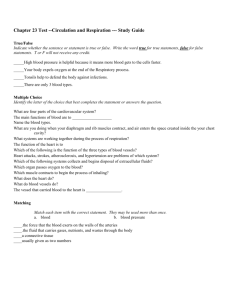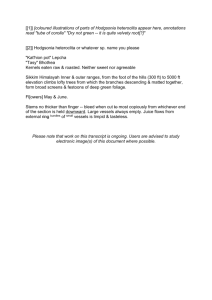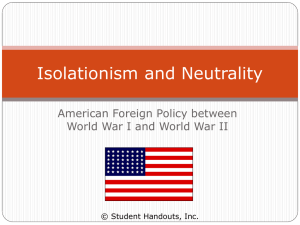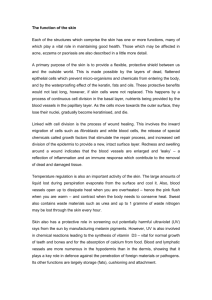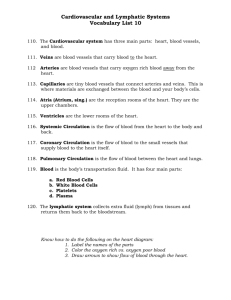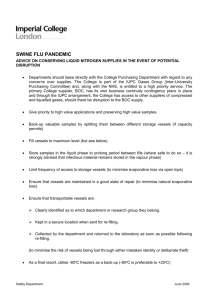8.4 Neutrality Compared 14-17 35
advertisement
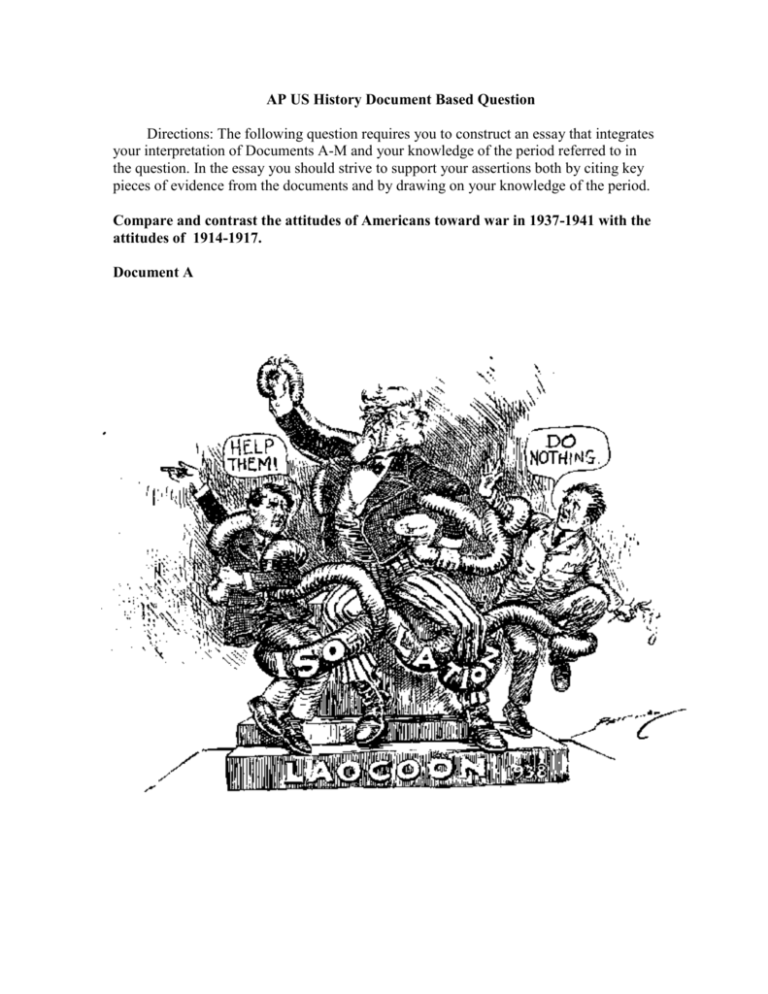
AP US History Document Based Question Directions: The following question requires you to construct an essay that integrates your interpretation of Documents A-M and your knowledge of the period referred to in the question. In the essay you should strive to support your assertions both by citing key pieces of evidence from the documents and by drawing on your knowledge of the period. Compare and contrast the attitudes of Americans toward war in 1937-1941 with the attitudes of 1914-1917. Document A Document B Declaration of Lima, 1938, Treaties and Other International Agreements of the United States of America, 1776-1949, ed. Charles I. Bevans, Vol. 3, p. 534-535 The Governments of the American States Declare: “That the peoples of America have achieved spiritual unity through the similarity of their republican institutions, their unshakeable will for peace, their profound sentiment of humanity and tolerance, and through their absolute adherence to the principles of international law, of the equal sovereignty of States and of individual liberty without religious or racial prejudices; …. Third. And in case the peace, security or territorial integrity of any American Republic is thus threatened by acts of any nature that may impair them, they proclaim their common concern and their determination to make effective their solidarity, coordinating their respective sovereign wills by means of the procedure of consultation, established by conventions in force and by declarations of the Inter-American Conferences, using the measures which in each case the circumstances may make advisable. It is understood that the Governments of the American Republics will act independently in their individual capacity, recognizing fully their juridical equality as sovereign states.” Document C President Franklin Roosevelt 's ''Quarantine the Aggressors'' Address, 1937 “The peace-loving nations must make a concerted effort in opposition to those violations of treaties and those ignorings of humane instincts which today are creating a state of international anarchy, international instability from which there is no escape through mere isolation or neutrality. Those who cherish their freedom and recognize and respect the equal rights of their neighbors to be free and live in peace, must work together for the triumph of law and moral principles in order that peace, justice and confidence may prevail throughout the world. There must be a return to a belief in the pledged word, in the value of a signed treaty. There must be recognition of the fact that national morality is as vital as private morality…. And mark this well! When an epidemic of physical disease starts to spread, the community approves and joins in a quarantine of the patients in order to protect the health of the community against the spread of the disease…. Most important of all, the will for peace on the part of peace-loving nations must express itself to the end that nations that may be tempted to violate their agreements and the rights of others will desist from such a cause. There must be positive endeavors to preserve peace.” Neutrality Act of 1937, U.S. Statutes at Large (75th Cong., Sess. I, p. 121-128). Document D Neutrality Act, 1937 ''Export of Arms, Ammunition, and Implements of War 'Section 1. (a) Whenever the President shall find that there exists a state of war between, or among, two or more foreign states, the President shall proclaim such fact, and it shall thereafter be unlawful to export, or attempt to export, or cause to be exported, arms, ammunition, or implements of war from any place in the United States to any belligerent state named in such proclamation, or to any neutral state for transshipment to, or for the use of, any such belligerent state. Neutrality Act of 1937. U.S. Statutes at Large (75th Cong., Sess. I, p. 121-128). Document E Mr. Con Says No: “Outraged by Nazi barbarism and Japanese megalomania, we are already emotionally drifting, as in 1914-17, toward the same maelstrom. Since Munich, American anti-dictatorship sentiment is just as hot as anti-German sentiment in 1916. England is again casting sheep’s eyes at us-witness Churchill’s short-wave radio appeal to America, Eden’s recent visit, recent English muttering about maybe paying a little on the war debt. In the name of saving freedom our liberals are again deserting anti-military principles. In sum, we are already hard at what Charles A. Beard, most distinguished of American liberal historians, calls the ‘demonology’ of naively splitting the world into blacks and whites and letting our emotions warp us into betting everything on the side of the angels. They were queer angels in 1919-witness the peace treaties they drew up. Also, in 1931, when they ran out cynically on American efforts to get Japan to respect the Kellogg treaty outlawing war. Also when they permitted the rape of Ethiopia.” Source: “Pro and Con: Should We Act to Curb Aggressor Nations?” Readers Digest, 1939. Document F Mr. Pro Says Yes: “Parallels with 1914-17 are miserably misleading here. Immature sympathies, Allied propaganda, interests with a financial stake in the Allied cause, had a lot to do with involving us then. Now the hard core of the matter is a natural horror at the bloody rape of China, the sadistic persecutions in Germany. There is no need for artificial propaganda against dictators. The brute facts of their behavior are an irresistible call to action.” Source: “Pro and Con: Should We Act to Curb Aggressor Nations?” Readers Digest, March, 1939. Document G German note to the United States, February, 1915 “Just as England has designated the area between Scotland and Norway as an area of war, so Germany now declares all the waters surrounding Great Britain and Ireland, including the entire English Channel as an area of war, and thus will proceed against the shipping of the enemy. For this purpose, beginning February, 1915, it will endeavor to destroy every enemy merchant ship that is found in this area of war without its always being possible to avert the peril that thus threatens persons and cargoes. Neutrals are therefore warned against further entrusting crews, passengers and wares to such ships.” Papers Relating to the Foreign Relations of the United States. Supplement: The World War, 1915. Washington. Government Printing Office, 1928, 96. Document H “The Government of the United States expresses the confident hope and expectation that American citizens and their vessels will not be molested by the naval forces of Germany otherwise than by visit and search, though their vessels may be traversing the sea area delimited in the proclamation of the German Admiralty. The United States Government protests.” February 10, 1915. Foreign Relations Supplement: The World War, 1915, 99. Document I Document J “It is important to reflect that if in this instance we allowed expediency to take the place of principle, the door would inevitably be opened to still further concessions. Once accept a single abatement of right, and many other humiliations would certainly follow, and the whole fine fabric of international law might crumble under our hands piece by piece. What we are contending for in this matter is of the very essence the things that have made America a sovereign nation. She cannot yield them without conceding her own impotency as a nation, and making virtual surrender of her independent position among the nations of the world.” President Wilson to Senator Stone, February 24, 1916. Foreign Relations Supplement: The World War, 1916, 178. Document K The United States to Germany April 18, 1916. “Vessels of neutral ownership, even vessels of neutral ownership bound from neutral port to neutral port, have been destroyed along with vessels of belligerent ownership in constantly increasing numbers. The Government of the United States has been very patient .... it has sought to be governed by the most thoughtful consideration of the extraordinary circumstances of an unprecedented war .... If it is still the purpose of the Imperial Government to prosecute relentless and indiscriminate warfare against vessels of commerce by the use of submarines without regard to what the Government of the United States must consider the sacred and indisputable rules of international law and the universally recognized dictates of humanity, the Government of the United States is at last forced to the conclusion that there is but one course it can pursue. Unless the Imperial Government should now immediately declare and effect an abandonment of its present methods of submarine warfare against passenger and freight carrying vessels, the Government of the United States can have no choice but to sever diplomatic relations with the German Empire altogether.” Foreign Relations Supplement: The World War, 1916, 233-34. Document L “The present war is a continuation of the old struggle among western nations for the material benefits of the world. It is a struggle by the German people to gain territory and power. It is a struggle by the English and French to prevent another European nation from becoming strong enough to demand a share in influence and empire. The last war demonstrated the fallacy of sending American soldiers to European battlefields. The victory we helped to win brought neither order nor justice in its wake, and these interminable wars continue unabated and with modern fury. We cannot impose a peace by force upon strong nations who do not themselves desire it, and the records of both sides show little indication of such a desire, except when it is to their own material advantage. Whether one reads a history of England, Germany, or France, the wish for conquest, when opportunity arose, has always overshadowed the wish for peace.” Source: Charles A. Lindbergh, “What Substitute for War?” The Atlantic Monthly, February, 1940. Document M

